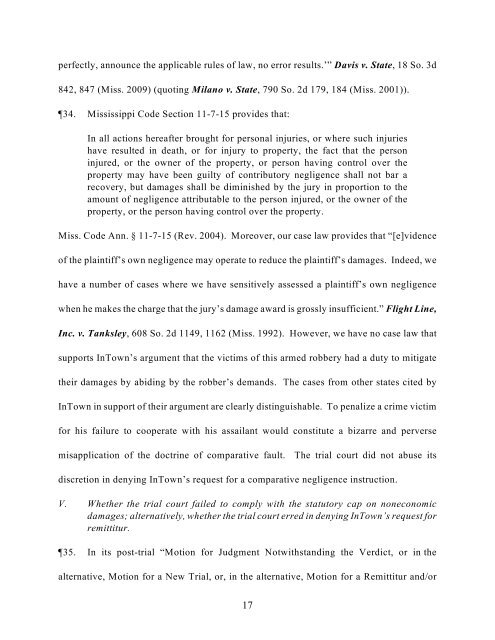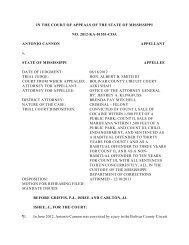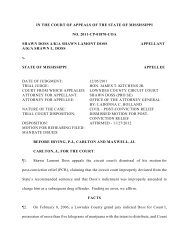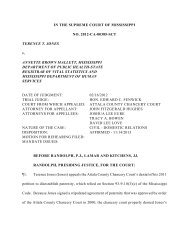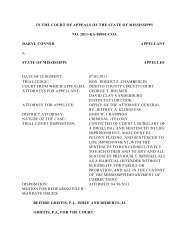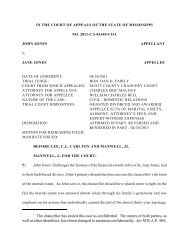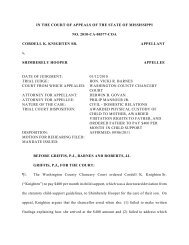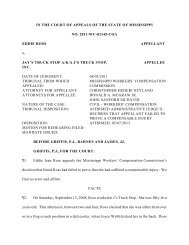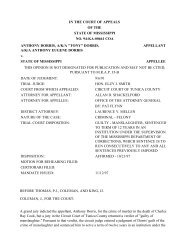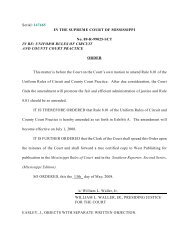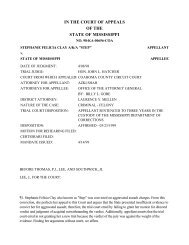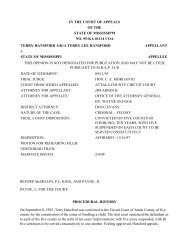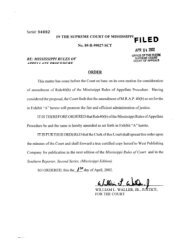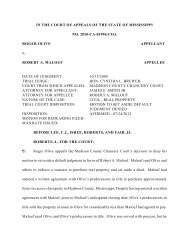intown lessee - Mississippi Supreme Court
intown lessee - Mississippi Supreme Court
intown lessee - Mississippi Supreme Court
Create successful ePaper yourself
Turn your PDF publications into a flip-book with our unique Google optimized e-Paper software.
perfectly, announce the applicable rules of law, no error results.’” Davis v. State, 18 So. 3d<br />
842, 847 (Miss. 2009) (quoting Milano v. State, 790 So. 2d 179, 184 (Miss. 2001)).<br />
34. <strong>Mississippi</strong> Code Section 11-7-15 provides that:<br />
In all actions hereafter brought for personal injuries, or where such injuries<br />
have resulted in death, or for injury to property, the fact that the person<br />
injured, or the owner of the property, or person having control over the<br />
property may have been guilty of contributory negligence shall not bar a<br />
recovery, but damages shall be diminished by the jury in proportion to the<br />
amount of negligence attributable to the person injured, or the owner of the<br />
property, or the person having control over the property.<br />
Miss. Code Ann. § 11-7-15 (Rev. 2004). Moreover, our case law provides that “[e]vidence<br />
of the plaintiff’s own negligence may operate to reduce the plaintiff’s damages. Indeed, we<br />
have a number of cases where we have sensitively assessed a plaintiff’s own negligence<br />
when he makes the charge that the jury’s damage award is grossly insufficient.” Flight Line,<br />
Inc. v. Tanksley, 608 So. 2d 1149, 1162 (Miss. 1992). However, we have no case law that<br />
supports InTown’s argument that the victims of this armed robbery had a duty to mitigate<br />
their damages by abiding by the robber’s demands. The cases from other states cited by<br />
InTown in support of their argument are clearly distinguishable. To penalize a crime victim<br />
for his failure to cooperate with his assailant would constitute a bizarre and perverse<br />
misapplication of the doctrine of comparative fault. The trial court did not abuse its<br />
discretion in denying InTown’s request for a comparative negligence instruction.<br />
V. Whether the trial court failed to comply with the statutory cap on noneconomic<br />
damages; alternatively, whether the trial court erred in denying InTown’s request for<br />
remittitur.<br />
35. In its post-trial “Motion for Judgment Notwithstanding the Verdict, or in the<br />
alternative, Motion for a New Trial, or, in the alternative, Motion for a Remittitur and/or<br />
17


